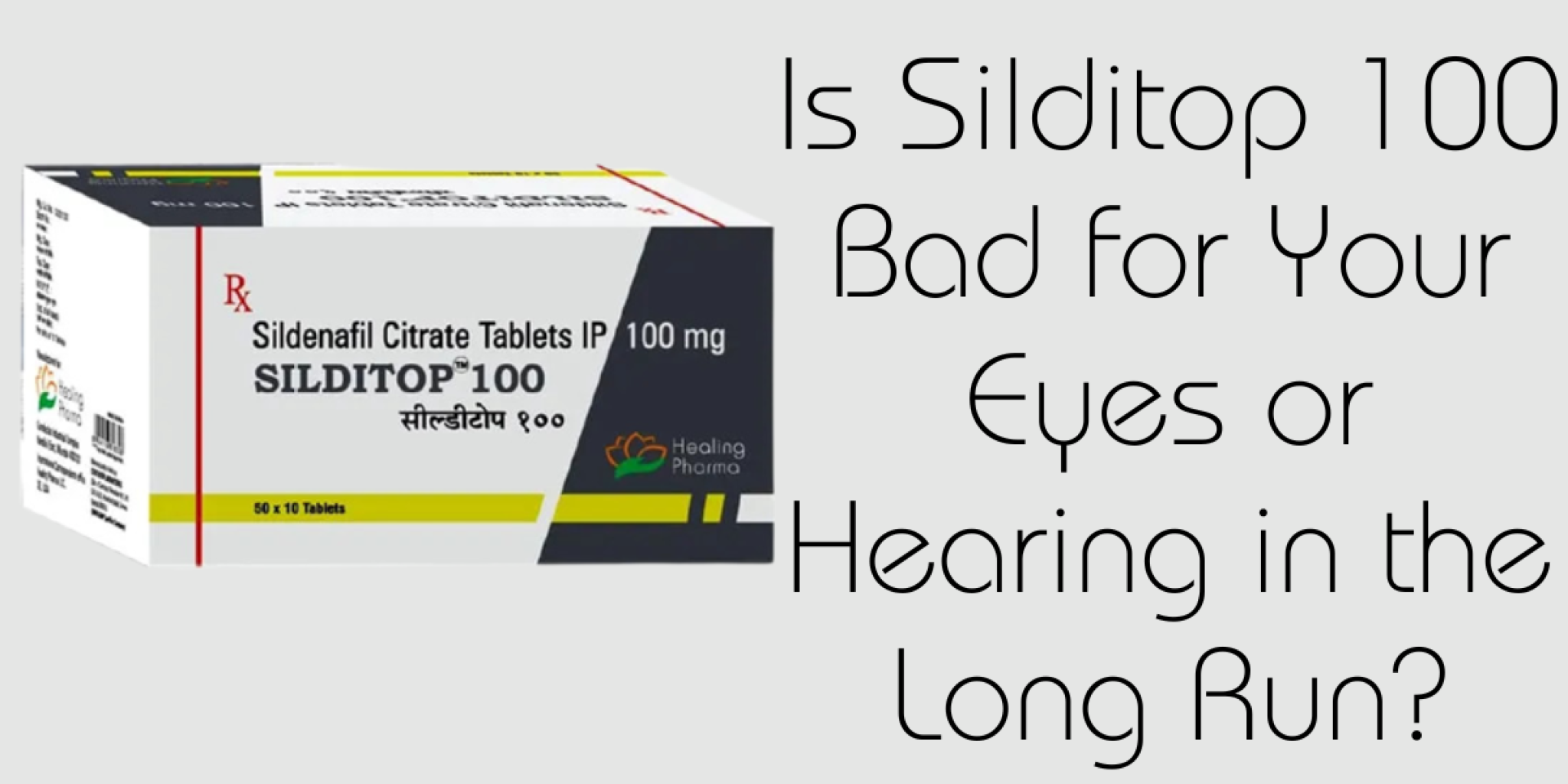views
Is Silditop 100 Bad for Your Eyes or Hearing in the Long Run?

Silditop 100 is a popular medication widely used to treat Erectile issues and other related conditions. Like many drugs, it comes with a set of known side effects, and concerns often arise regarding its safety, particularly when used over an extended period. Among these concerns, some users wonder if Silditop 100 could be harmful to their eyes or hearing in the long run. This article aims to shed light on this important question by examining the potential risks, scientific evidence, and safety tips for those using Silditop 100.
What is Silditop 100?
Silditop 100 contains Sildenafil citrate as its active ingredient, which belongs to a class of drugs called phosphodiesterase type 5 (PDE5) inhibitors. Sildenafil works by relaxing blood vessels, improving blood flow to particular areas of the body. It is most commonly prescribed to treat Erectile challenges but is also used for pulmonary arterial hypertension.
Its effectiveness and relative safety have made Silditop 100 a preferred choice for millions worldwide. However, as with any medication, it’s crucial to understand both the short-term and long-term side effects, especially concerning sensitive organs like the eyes and ears.
Known Side Effects of Silditop 100
Short-term side effects of Silditop 100 are generally mild and temporary. They include headaches, flushing, nasal congestion, dizziness, and sometimes indigestion. However, some users have reported changes in vision and hearing, raising concerns about the long-term safety of this drug.
The official prescribing information does warn about potential vision and hearing disturbances, although these are relatively rare. Still, it’s important to dive deeper into what these sensory side effects entail and how serious they might be.
Effects of Silditop 100 on Eyes
Visual disturbances are among the most commonly discussed side effects related to Sildenafil. Some users experience blurred vision, increased sensitivity to light, or changes in color perception, such as a blue tint to vision. These symptoms are usually temporary and resolve once the medication wears off.
More rarely, Silditop 100 has been associated with a serious eye condition called non-arteritic anterior ischemic optic neuropathy (NAION). NAION causes sudden vision loss due to reduced blood flow to the optic nerve and, while extremely rare, it’s considered a medical emergency.
Scientific studies indicate that while Sildenafil can affect ocular blood flow and retinal function, the incidence of long-term or permanent vision damage is very low. Still, individuals with pre-existing eye problems, such as glaucoma or diabetic retinopathy, may face higher risks and should consult a healthcare provider before using Silditop 100.
Effects of Silditop 100 on Hearing
Hearing-related side effects, including sudden hearing loss or tinnitus (ringing in the ears), have also been reported by some users of Sildenafil-based medications. Sudden sensorineural hearing loss (SSHL) is a rare but serious adverse event that requires immediate medical attention.
Though the exact mechanism isn’t fully understood, it’s thought that changes in blood flow caused by PDE5 inhibitors might impact the delicate structures of the inner ear. However, large-scale clinical trials have not definitively proven a strong link between Silditop 100 mg and long-term hearing damage.
Users who experience ringing, muffled hearing, or sudden hearing loss after taking Silditop 100 should stop the medication immediately and seek medical care.
Long-Term Risks: What Does Research Say?
There is limited data specifically addressing the long-term impact of Silditop 100 on eyes and hearing because most clinical studies focus on short-term use. However, experts generally agree that for the vast majority of users, long-term use of Silditop 100 at recommended doses does not lead to significant lasting damage to vision or hearing.
That said, ongoing research is necessary, and long-term users should remain vigilant about any sensory changes.
Who is at Higher Risk?
Certain factors increase the risk of experiencing eye or hearing problems with Silditop 100:
- Age: Older adults may be more susceptible.
- Pre-existing conditions: Diabetes, hypertension, or known eye diseases can elevate risk.
- Dosage and frequency: Using higher doses or taking the medication more often than prescribed increases risk.
- Concurrent use of other medications: Some drugs might interact with Silditop 100 to increase side effects.
Safety Tips for Users of Silditop 100
To minimize risks related to eye and hearing health, consider the following precautions:
- Always use Silditop 100 exactly as prescribed.
- Inform your doctor if you have a history of eye or ear problems.
- Monitor any changes in vision or hearing, no matter how minor.
- Seek immediate medical attention if you experience sudden vision loss, hearing loss, or severe visual disturbances.
- Regular check-ups with your healthcare provider are important if you use the medication long-term.
Alternatives and Precautions
If you are concerned about sensory side effects, talk to your healthcare provider about alternative treatments for Erectile disorder or pulmonary hypertension. Sometimes lifestyle changes such as diet, exercise, or counseling can complement or reduce the need for medications.
Conclusion
While Silditop 100 is generally safe for most users, it does carry some risk of affecting the eyes and hearing, especially in those predisposed to related conditions or when used improperly. Most side effects related to vision and hearing are rare and reversible, but awareness and caution are key. By following medical advice, monitoring your symptoms, and seeking prompt care when necessary, you can safely benefit from Silditop 100 without compromising your sensory health.



Comments
0 comment